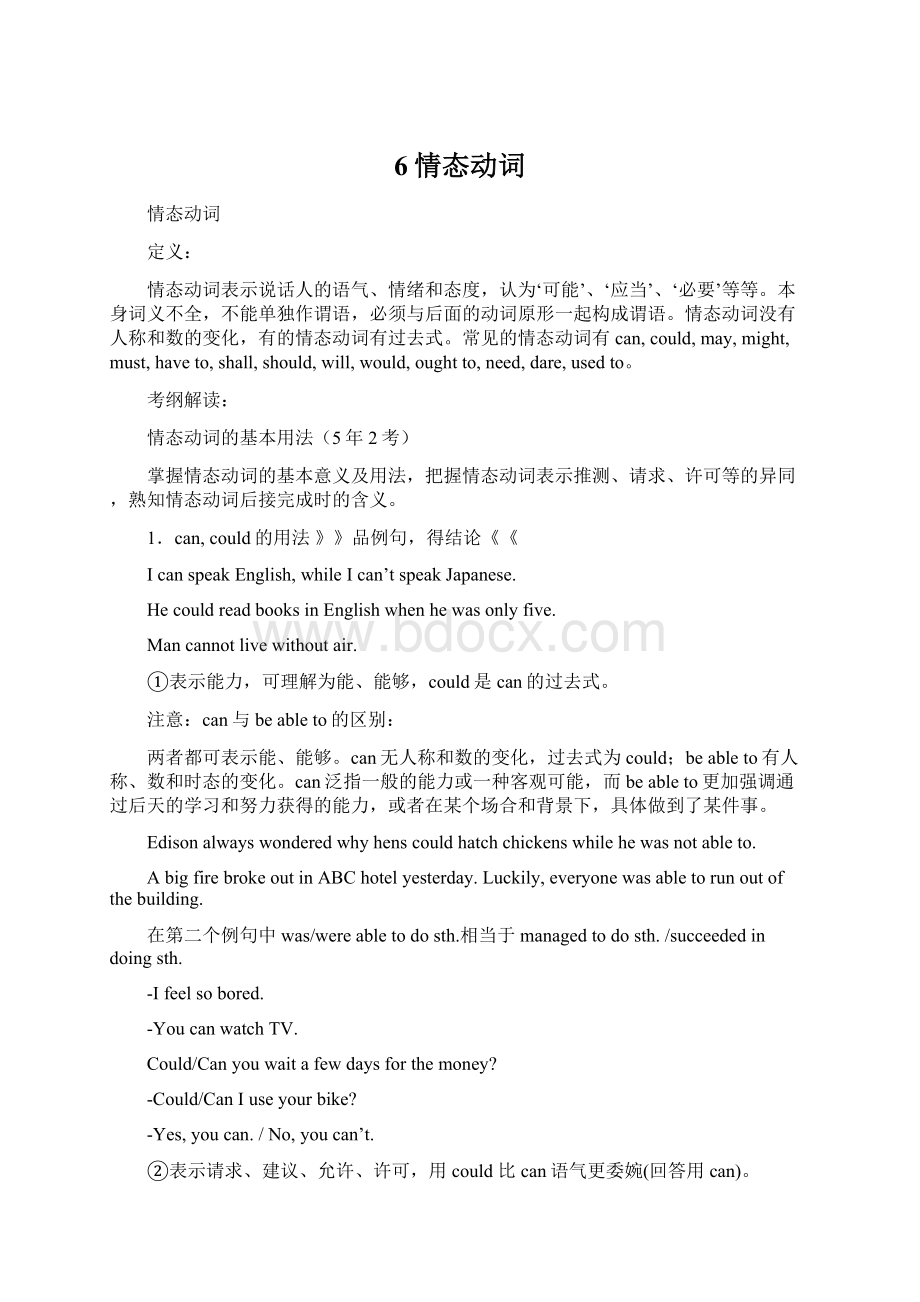6情态动词Word格式文档下载.docx
《6情态动词Word格式文档下载.docx》由会员分享,可在线阅读,更多相关《6情态动词Word格式文档下载.docx(18页珍藏版)》请在冰豆网上搜索。

②表示请求、建议、允许、许可,用could比can语气更委婉(回答用can)。
He’ssuchanicepersonthathecan’tcommitthecrime.
Canitbetrue?
Howcanyoubesocareless!
③在否定句、疑问句和感叹句中,表示怀疑、惊异、不相信的态度。
Youcannotbetoocareful.
Icouldn'
tbutchoosetowait.
Theimportanceofreadingcan’tbestressedtoomuch.
④惯用形式,总结:
cannot(can'
t)…too…/toomuch/enough无论怎么……也不(过分)
cannot/couldn'
thelpbutdo…;
candonothingbutdo…;
cannot/couldn’tbutdo…不得不;
只好
can’thelpdoing…情不自禁……
can’thelp(to)do…无法帮助……
Heisinhospital.Hecan'
tbeatschool.
Hecan’t/couldn’thavefinishedthetaskallalone.
Canhebefreenow?
Itcanbequitecoldintheautumn.
⑤在否定句和疑问句中,表示对现在的状态、现在正在进行的动作和过去的推测。
用于否定句,意为不可能。
用于疑问句,意为会不会。
can’t/couldn’thavedone意为过去不可能做过某事,其反义形式为musthavedone。
在肯定句中,表示理论上如此,现实中不一定。
2.may,might的用法》》识规律,辨真伪《《
①表示允许、请求。
Might/MayI…?
might比may语气更为委婉和有礼貌。
—MayIaskyouaquestion?
—Yes,please.
—MayIwatchTVaftersupper?
—Yes,youmay/can.或No,youmaynot./No,youcan’t./You'
dbetternot./Youmustn'
t.(强烈的禁止语气)
②惯用形式,总结:
may/mightaswelldo不妨做……,最好;
相当于hadbetterdo
maywelldo很/极可能
maywellnotdo很可能不
may…but…尽管……但是……
Youmayaswellgobackhomeearly.
Hemaybelazy,buthecanworkveryhardwhenhefeelslikeit.
③表示祝愿(不用might)。
采用部分倒装语序:
May+主语+动词原形+其他!
Mayyoubehappyeveryday!
Mayyousucceed!
④may用于肯定句和否定句中,表示对现在的状态、现在正在进行的动作和过去的推测。
may/mighthavedone表示过去可能做过某事。
(1)用于肯定句,意为“也许,可能”,might的可能性比may更小。
Hehasacar.Hemaycomebycar,butIamnotsure.
Hemighthavewateredtheflowers,forthereislesswaterinthetank,butIamnotsure.
(2)用于否定句,意为“也许不/没有,可能不/没有”。
Itisrainingsohard.Myfriendmaynotcome.
Exercises:
翻译:
①-那个女孩是玛丽吗?
-那个女孩不可能是玛丽,玛丽去了美国。
②-那个女孩是玛丽吗?
-那个女孩可能不是玛丽,玛丽今天好像穿了红色的衣服,但是我不确定。
③你最好给你的父母打个电话,他们现在极有可能非常担心你。
④愿我们友谊长存!
3.must,haveto的用法》》识规律,辨真伪《《
①must表示“必须”,强调主观看法,只有现在时形式,否定式是mustnot(mustn'
t),表示“禁止,不准”。
Everybodymustobeytherules.
Youmustn'
tspeaklikethattoyourmother.
—MustIhandinthecompositiontomorrow?
—Yes,youmust./No,youneedn’t./No,youdon’thaveto.
[温馨提示1]当must作“必须”意义讲时,其反意疑问部分用needn'
t;
当含有mustn'
t时,其反意疑问部分用must/may。
Youmustgonow,needn'
tyou?
tsmokehere,must/mayyou?
[温馨提示2]haveto表示“必须,不得不”,着重强调客观需要,能用于更多时态(现在、过去和将来)。
Ihavetopickupmychildren.
Ihadtoleaveatthattime.
Thestudentsoftodaywillhavetoknowhowtousethecomputersoftomorrow.
②用于肯定句,表示有把握的推测,意为“一定,肯定”。
表示对现在的状态、现在正在进行的动作、过去的动作的肯定推测。
否定式为can’t
Thismustbeyourpen.→mustdo/be现在→否定:
can’tdo/be
Hemustbedoinghishomeworknow.→mustbedoing正在→否定:
can’tbedoing
Hemusthavearrivedalready.→musthavedone过去→否定:
can’t/couldn’thavedone
[温馨提示]当情态动词must表推测时,反意疑问部分助动词的使用要根据情态动词后面所隐含的时间来确定
Youmustbehungrynow,aren'
Youmusthaveheardaboutit,haven'
Youmusthavewatchedthatfootballmatchlastnight,didn'
③must有“偏要,硬要”之意。
常出现于ifyoumustdo…固定句型中。
Ifyoumustleave,doitquietly.
Mustyoumakeanoiselikethis?
④amust:
必须做的事;
必需之物
Awarmcoatisamustinthecoldwinter.
Patienceisamustifyouwanttodoyourjobwell.
-那个女孩一定是玛丽,只有她的头发是红色的。
②你偏要半夜弹钢琴吗?
③我今天必须交作文,是吗?
选择:
①(2014·
安徽合肥市第一次质检)Theyhavebeentrainingveryhardthewholeseason,andtheyCwinthismatch.
A.mightB.mayC.mustD.should
②(2014·
安徽皖南八校第一次联考)Asawell-knownChinesesayinggoes,“Ifyouwanttoberich,youBfirstbuildroads.”
A.mayB.mustC.canD.will
③(2010·
安徽,32)Jackdescribedhisfather,whoDabraveboymanyyearsago,asastrong-willedman.
A.wouldbeB.wouldhavedoneC.mustbeD.musthavedone
4.will,would的用法》》试真题,得规律《《
(江苏卷)Dayslater,mybrothercalledtosayhewasallright,butC saywherehewas.
A.mustn’tBshouldn’tC.wouldn’tD.mightn’t
①用于各种人称,表示意志或决心。
will指现在,would则指过去。
Iwilldomybesttohelpyouineveryway.
Iwillgototheparkwithyoutomorrowifyouwilloffermelunch.从句中will表意愿
(2013·
福建,33)-Wouldyoumindansweringsomequestionsonshoppinghabits?
-D.
A.Yes,withgreatpleasure.B.No,IamafraidIcan’tmakeit.
C.Yes,itisworththetime.D.No,aslongasitdoesn’ttakelong.
②用于第二人称的疑问句中表示礼貌地询问和请求,would比will更委婉。
Wouldyouplease/like/mind…?
Wouldyouteachushowtodriveacar?
新课标Ⅰ,29)ThedoorCopen,nomatterhowhardshepushed.
A.shouldn’tB.couldn’tC.wouldn’tD.mightn’t
③表示功能,意为“能”或“行”。
Hetriedthedooragain,butitwouldn'
topen.
(2014·
四川,6)IstillremembermyhappychildhoodwhenmymotherCtakemetoDisneylandatweekends.
A.mightB.mustC.wouldD.should
④表示习惯性、经常性、倾向性,意为“经常、总是、惯于”。
will指现在,would指过去。
Theoldmanwouldhaveasmokeunderabigtreeeveryafternoonafterhefinishedhisfarmwork.
[温馨提示]表示‘习惯’时would与usedto的区别:
规则1:
would表示反复发生的动作。
如果某一动作没有反复性,就不能用would,只能用usedto。
如:
Fromthatdayon,motherwoulddisappearintohersewingroomtopractise.从那天起,妈妈就去做针线活的房间练习起来。
(具有反复性)
IusedtoliveinBeijing.
我过去住在北京。
(没有反复性)
规则2:
usedto表示过去经常性或习惯性的动作或状态,现在已经结束,would则表示有可能再发生。
Peopleusedtobelievethattheearthwasflat.(现在已不再这样认为)
Hewouldgototheparkassoonashewasfree.(现在有可能还去)
安徽,28)IDtomycousin’sbirthdaypartylastnight,butIwasnotavailable.
A.wentB.hadgoneC.wouldgoD.wouldhavegone
⑤would/wouldn’thavedone表示虚拟,过去本来要/不要做某事,但是实际上没做/做了。
-MyhusbandandIreallylikedthecar,butwedidn’thavemoneyatthattime.
-OryouDit.Whatapity!
A.boughtB.hadboughtC.wouldbuyD.wouldhavebought
⑥表示说话人的推测,意为“大概,也许”。
would的肯定性不如will强,语气比较弱。
Thatwillbethemanyouwanttosee.
Perhapsshewouldbewillingtomeetus.
5.shall,should,oughtto的用法》》品例句,得结论《《
ShallIgetyousometea?
-Wewantsomeonetodesignthenewartmuseumforus.
-Shalltheyoungfellowhaveatry?
①shall表示征询意见,用于第一、第三人称疑问句。
[温馨提示]ShallI/we…?
的回答,可用Yes,please./Allright./I'
msorry,but…等。
YoushalldoasIsay.(命令)
Youshallhavemyanswertomorrow.(允诺)
②shall表示说话人的意愿,有命令、允诺、警告、决心等意思,用于第二、第三人称。
“Theinterestshallbedividedintofiveparts,accordingtotheagreementmadebybothsides,”declaredthejudge.
Oneofourrulesisthateverystudentshallwearschooluniformwhileatschool.
③shall用在条约、规章、法令等文件中,表示必然结果,多用于第二、三人称,常译为“必须”。
解题关键词:
agreement,regulation,rule,law
[温馨提示]must表示“必须”,只是一种主观要求,语气与shall相比,差之甚远。
Youshouldbepolitetotheold.
Weshouldn’twasteanyfood.
④should表义务,意为“应该”,可用于各种人称。
It'
s9:
00.Thesupermarketshouldbeopen.
Thefilmshouldbeverygoodasitisstarringfirst-classactors.
s8o'
clocknow.Theyshouldbeathomenow.
⑤should表示推测或责备,意为“想必一定,照说应该,估计”等;
表推测时往往指推测有一定的依据。
should/oughtto表示猜测时,只能用于肯定句中,意为“理应,应当”(依据常规、常理、风俗、习惯等进行推测)。
Whyshouldyoubesolatetoday?
It’sapitythattheyshouldbesocareless.
⑥should用于表示惊奇、遗憾不该发生的事情,常译作“竟然”。
常与why/who/how等疑问词连用。
Youshouldn'
tjudgeastrangeralwaysbytheclotheshewears.
Parentsoughttosendtheirchildrentoschoolwhentheyreachsevenyearsold.
⑦在大多数情况下,oughtto都可以被should代替。
oughtto语气比should重,往往表示从法律上或从道义上“应该”。
oughtto的否定形式为oughtnotto/oughtn’tto
Lookatyourpoorscore!
Youshouldhaveworkedhard.
Wewerelate.Weshouldn’thavetakenthatroad.Wespentmoretime.
⑧should;
oughtto/shouldn’t;
oughtn’ttohavedone表示本应该/本不应该做某事,但实际上没做/做了
6.need的用法》》识规律,辨真伪《《
①need作情态动词表示“需要,必要”。
通常用于否定句、疑问句、条件句中,且只有现在时,其他时态用“haveto”的相应形式代替。
Youneedn'
twaterthetomatoplantsnow.
—Needhecomenow?
—Yes,hemust./No,heneedn'
t./No,hedoesn'
thaveto.
②need还可以用作行为动词,其变化和一般的动词相同。
needdoing=needtobedone
Weneedtohavearest.我们需要休息。
Thehouseneedsrepairing/toberepaired.
③“Must…?
”一般疑问句的否定回答要用No,…needn'
t/don'
thaveto等。
—MustIfinishmyhomeworknow?
—No,youneedn'
t./No,youdon'
④need/needn’thavedone表示本需要/本不需要做某事,但实际上没做/做了
Weneedn’thaveboughtsomuchfoodnowthatSuziewon’tbewithusfordinner.
①-MustIgotothegymthreetimesaweek?
-No,youB.TwiceaweekisOK.
A.mustn’tB.needn’tC.can’tD.shouldn’t
②(全国卷)IDuseaclocktowakemeupbecauseatsixo’clockeachmorningthetraincomesbymyhouse.
A.couldn’tB.mustn’tC.shouldn’tD.needn’t
7.dare的用法》》识规律,辨真伪《《
①dare作情态动词表示“敢于”,用于否定句、疑问句和条件句中。
Shedarenotgothere.
Howdarehedosuchathing?
②惯用短语“Idaresay”意为“我想,大概”。
Idaresayheisright.
③dare还可以用作行为动词,其变化与一般动词相同。
Thegirldidn'
tdaretogohome.
Doyoudaretojumpintotheocean?
Idon'
tdare(to)askher.
[温馨提示]在否定句中,dare后的“to+动词原形”可以省略to。
Exercise:
-Dareyourlittledaughterstayathomealoneatnight?
-B.
A.Yes,shedoesB.No,shedarenotC.No,shedoesn’tD.Yes,shedaresnot
8.情态动词+完成式》》再归纳,辨不同《《
①musthavedone表示对过去所发生的事情的肯定推测,意为“一定做过某事”,如:
There'
snolightintheroom.Theymusthavegonetobed.
②can'
t/couldn’thavedone,表示过去所发生行为的不可能性,意为不可能做过某事,通常用在否定句和疑问句中。
而could